The Big Combo (1955) dir. Joseph A. Lewis | writ. Philip Yourdan | cine John Alton [special effects Jack Rab & Louis Dewitt] prod. Sidney Harmon edt. Robert Eiseer sound Earl Synder music David Raskin
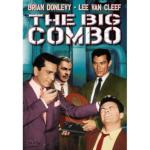 star. Richard Conte (Mr. Brown) Cornel Wilde (Lieu. Leonard
Diamond) Jean Wallace (Susan Lowell) Brian Donlevy (Joe McClure) featuring Lee
van Cleef (Fante) Earl Holliman (Mingo) Robert Middleton (Peterson) Helen
Walker (Alicia) Jay Adler (Sam Hill) John Hoyt (Nils Dreyer) Ted de Corsia
(Bettini) Helene Stanton (Rita)
star. Richard Conte (Mr. Brown) Cornel Wilde (Lieu. Leonard
Diamond) Jean Wallace (Susan Lowell) Brian Donlevy (Joe McClure) featuring Lee
van Cleef (Fante) Earl Holliman (Mingo) Robert Middleton (Peterson) Helen
Walker (Alicia) Jay Adler (Sam Hill) John Hoyt (Nils Dreyer) Ted de Corsia
(Bettini) Helene Stanton (Rita)
Allied Artists | b
& w 84 mins | 1955
the shabby cellar of American modernism
|| The Big Combo. Jazz, sex, crime. Sub-culture, the underworld... and sexual jealousy defines reality in the night-scape of the urban jungle. Pedigreed wasp blonde girl becomes the victim of the Mafia hoodlum Mr. Brown... a script writer's code name designed merely to deflect cries of racism, although "Brown" is as clearly Italian as his Bolemac Corporation is mafioso, part of that bigger combine headquartered in Sicily.
"The largest pool of illegal money in the world," declares Captain Peterson as his Lieutenant, Leonard Diamond (Cornel Wilde), argues the case for going after Brown. And Diamond does go after him, because he's in love with Susan, Brown's victim lover. The symbolism is plain and basic: the values of American society have been seduced and corrupted by the shadowy blood combine, the Mafia.
Just how Mr. Brown (Richard Conte) makes his money isn't clear, except that he runs the Bolmec Corporation from a hotel called "The Bolmec", has a torture chamber in the basement which is filled with whiskey barrels left over from the Prohibition era, and a concealed vault in his upstairs suite which contains stacks of money and a gun rack. Tommy guns? Revolvers, automatics, sawed-off this and that? Guns aren't illegal and neither is money... but we get the picture. Brown is a gangster, a handsome glistening snake in a suit who sleeps during the day and slithers at night. And he never sheds his skin either, as he's as incorrigible at the end as he is at the beginning.
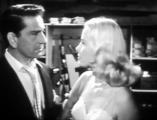
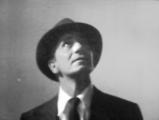
The beautiful Susan makes him look "legitimate", and as a former prison guard, he tries to keep his friends and enemies close. The film starts with Susan (Jean Wallace) running down a dark alley pursued by two retainers, Fante and Mingo, who corner her in the bleak concession area, back of the arena where Brown is watching a boxing match. It's the jungle alright, although it's defined by empty monochromatic spaces, shadows, reflected light... a gray world of cigarette smoke and urban fog, the shabby cellar of American modernism.
the only thing I play now is stud poker
Susan is like a junky without a needle. She craves love, as if her lover is just holding out on her like a crooked dealer in the casino. In one scene, Brown says, "Love? We can talk about love another time." Like a child pretending to run away, she's trying to escape Brown... or her father or her corroding guilt and shame. She wants to be found, even if it means death. The objective of all addiction is death and it soon comes calling for Susan.
Except, of course, she has a saviour, an unknown admirer called Leonard Diamond (Cornel Wilde), a detective at the local precinct. Like some guy in love with a photograph, Diamond's obsession is driven by an unstated cultural idealism, the need to save a pretty blonde from the embrace of this Mediterranean Othello called "Mr. Brown". Even Diamond's superior, Captain Peterson, knows his crusade is driven by an unhealthy infatuation, and the mafioso business is mere subtext. Brown's criminal activities simply provides Diamond with a legitimate excuse to eliminate a sexual rival.
When asked by the family friend and unlikely nightclub cruiser Audubon why she is isn't at the symphony tonight with her parents, or playing the piano, Susan says, "The only thing I play now is stud poker." While the immediate reference seems to point to the declasse boxing culture of Brown and his enforcers, the irony cuts another way, infers that the sexual victim was not always a victim.
Diamond? He's a bit of a stud himself, has a nice leggy dancer called Rita on tap. Their situation is a bit like Brown & Susan: she's in love with him, desires commitment, but he has an agenda that keeps their relationship simply sensual. Because of her show biz connections, she's also a good source of information about what's going down on the street. He's always after her for updates on Brown. At one point he expresses his anger and bafflement about Susan being in love with a criminal. Rita says, "A woman doesn't care how a man makes a living, only how he makes love." Obviously she rates Diamond high in this regard, as she later takes a bullet for him.
you like crazy drums?
Brown has a capo called Joe McClure (Brian Donlevy), an older gent who was passed over in favor of Brown by the organization when the previous don, Grazzi, supposedly retired to Sicily. In fact Joe used to run the hotel, feels he was swindled out of it by Brown, harbours a major grudge. He wears a hearing aid, is never spared his boss's brutal contempt. When he displeases Brown, Brown turns up the volume on his hearing aid, has Mingo scream in his ear. Not only jazzers improvise, it seems.
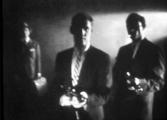
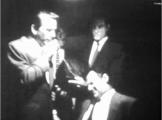
This form of torture is later refined and used in one of the more original scenes in the film when Fante and Mingo snatch Diamond from his apartment and bring him to the cellar of the Bolmec Hotel for some re-education. It's ugly stuff, especially for 1955 when The Big Combo was released. McClure decides he's going to break Diamond and proceeds to smash him around, although Fante says "Mr. Brown says he isn't to be touched."
Brown arrives, takes exception, rips the hearing aid from McClure's ear, sticks it in Diamond's. "You like drums, Lieutenant?" says Brown. "Crazy drums?" He takes the radio which is playing some jump jazz drum solo, amps it through the hearing aid, cranks the volume. Tied to his chair, Diamond writhes in agony, a victim of some unknown player's dangerous euphoria. Mingo screams like a crazy vocalist, Brown barks questions. Crazy drums. It's sublime, if indeed torture can be viewed as sublime, because the symbolism is sublime. Brown and his combo of hoods -- old Joe, Fante & Mingo -- aren't just criminals, they're hipsters from hell. They liquor Diamond up with some 40 proof hair tonic. Crazy drums. Diamond is dumped in the hallway outside Captain Peterson's apartment. Crazy drums. Jazz is the outlaw music. America runs crazy in the darkness.
|| For a large part of the action, the plot drag-line is a lift of the Citizen Kane "Rosebud" device; in the Big Combo, it's a woman called Alicia. A number of familiar melodrama motifs are used, including insanity, a yacht murder... and an ending in the fog where the blocking -- if not the sentiment -- is taken from Casablanca. Yet despite the unoriginal story, the Big Combo is very original as it comes at the close of the film noir era. Motivation is a post-modern irrelevancy, as assumptions about character and story can be made simply on the basis of history. As a sociopath, Mr. Brown is completely in line with the contemporary criminal villain in film, who acts freely without a conscience. Even when you think Brown is driven by a psychological wound (Alicia), this turns out to be nothing more than an inconvenience on his way to power within the combine. Even the genre dialogue moves beyond witty cynicism into the existential. When Brown learns that his hunter is in love with Susan, he says, "Diamond in love? That's not possible." Brown assumes that Diamond is exactly like him, just another predator in the night with an organization behind him. Small change, sure, but a realist like him.
Philip Yourdan also wrote The Conquest of Space screenplay and a western called The Man From Laramie around the same time as he wrote The Big Combo, so this might explain the style of science and homicide here. Gadgets... Diamond dictates his memos into a reel-to-reel tape recorder, Brown misuses Joe McClure's hearing aid. There's an element of submerged parody throughout the action, from Brown's monologues about power, strength and weakness, to (some think) an implied homosexual rapport between Fante and Mingo. And the Citizen Kane motif: "Alicia, Alicia... don't know if it's a horse, a boat, or a girl," cries an exasperated Captain Peterson as he and Diamond discuss the latest lead.
And how serious is Diamond's declaration of love to Susan in an empty nightclub as an unknown pianist hammers out a mad overture in the shadows? It's a pulp fiction zaniness where nothing is normal except the abnormal. Even Diamond's stalwart associate Sam has the scarred face of a circus freak, as if he stepped straight from the drawing board of a comic book illustrator.
Photographically The Big Combo is theatre, where the landscape is pure illusion, shaped by light and shadow. Much is always made of this chiaroscuro aspect of film noir, although the "art" is always an issue of economy, and the fact that this is how it was done in live theatre production. John Alton's cine is justly celebrated, however, for its deco angles and porous backgrounds which retain definition while merging with the foreground. It's like lino cut art or wood block engraving, where the symbolism of shape advances image articulation.
I'd rather be insane and alive than sane and dead
Richard Conte is superb as the malevolent Mr. Brown who always has to be number one. "First is first, second is nobody," he lectures a boxer who sits bloody and demoralized after losing a fight. Conte's character has some great lines, which mostly celebrate his strength in contrast to the weaklings around him. This was his best role after playing a stubborn truck driver in Jules Dassin's 1949 crime drama Thieves Highway, and certainly better than his largely cosmetic part as Don Emilio Barzini in The Godfather. Although he was small in stature, Conte, like Alan Ladd or James Cagney, had an outstanding physical presence. As a movie hoodlum, the Big Combo puts him in the gallery of gangster greats (Cagney, White Heat; Ray Danton, The Rise & Fall of Legs Diamond; Lee J. Cobb, On the Waterfront; Lee Marvin, The Big Heat; Al Pacino, Scarface; Lawrence Tierney, The Hoodlum, etc etc).
For Cornel Wilde, his urgent character is quite different from the passive novelist in love with a manipulative beauty that he played in Leave Her to Heaven (1945). Diamond is a familiar and dangerous mix: a missionary posing as a cop. He's trying to save Susan Lowell with the urgency of an evangelist. With the advantage of hindsight, you can see that while he lives in a secular world, his narrow idealism is imprinted by a previous generation... and you wonder if he wasn't in love, how concerned with evil would he be. Still, it's a dangerous world. As Brown's wife says: "I'd rather be insane and alive than sane and dead."
© LR 1/07